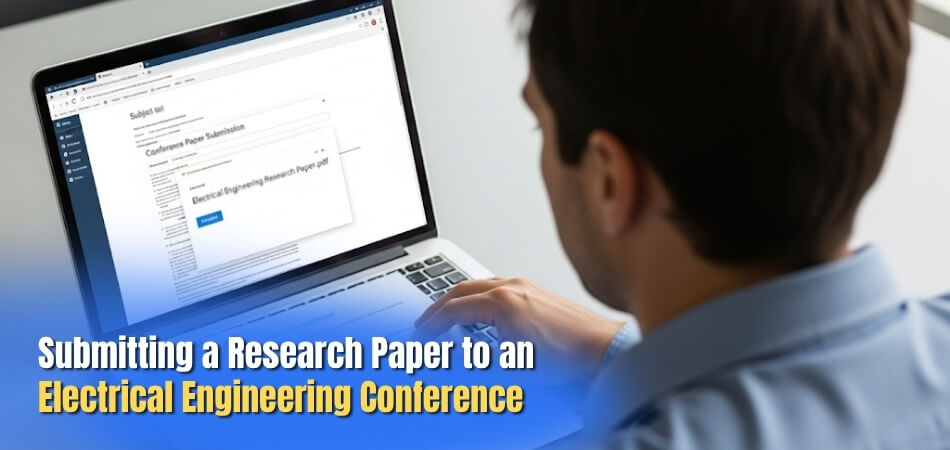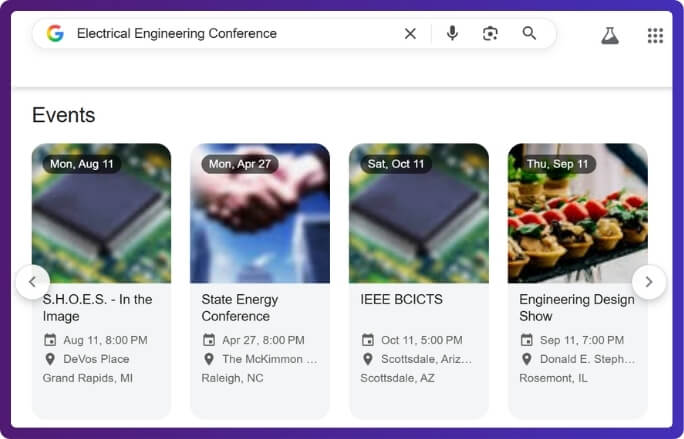The submission of a research paper to an electrical engineering conference is a big step for anyone working on something new in this field. It gives you a chance to share your ideas and see what others are doing too. You might already be planning your paper or looking at conference dates. Maybe you’re even thinking about how can I submit a research paper to an electrical engineering conference?
Submit your electrical engineering paper by choosing the right conference, following submission rules, writing clearly, and citing sources. Upload your paper before the deadline. After review, be ready to revise or present. Each step helps you grow and share your work.
If this topic sounds like something you want to know more about, keep reading. This article covers everything you need, step by step, from picking the right event to what happens after you submit. You’ll find all the important points explained clearly right here.
How Can I Submit a Research Paper to an Electrical Engineering Conference?
Getting your paper into an electrical engineering conference is a great idea. These conferences help you share your work and learn from others too. The process might look hard at first, but it’s really simple. Keep reading to learn all the steps you need to follow.

Pick the Right Conference
There are many conferences that focus on different parts of electrical engineering. Some talk about robotics, while others focus on power or circuit designs. If you’re planning for global events like conferences in USA, Canada, or any other country, make sure the topic matches your paper. Check their websites to read about their main subjects and deadlines. Picking the right conference is the first and most important step.
Read the Guidelines
Every conference has rules that tell you how to send your paper. These are called submission guidelines, and they are always listed online. You need to follow these exactly, or your paper may be rejected. Look for details like word limit, font style, and file format. Following the rules shows that you are serious and careful. Take time to understand everything clearly before you move forward.
Write Your Paper Well
Start your paper with a short introduction about what you studied. Then explain everything clearly using simple words and short sentences. Divide your work into small sections so it’s easier to understand. Don’t forget to add a conclusion that sums up your idea. Go through your paper again to fix grammar or spelling errors. A clean and simple paper is always better than a complicated one.
Use Good References
Adding references makes your paper stronger and more trustworthy for the reader. These show where your ideas or facts came from. You can use books, articles, or other papers as your sources. Make a list at the end using a neat and simple format. Always give credit when you use someone else’s ideas. This helps avoid any kind of confusion or problem later on.
Get Feedback Early
Asking someone to read your paper can really help improve your work. They might find small mistakes or confusing parts that you didn’t notice. It’s always better to fix things before sending them. Choose someone who understands your topic well if you can. Listen to their suggestions, but make your own decisions. A second opinion is always helpful before final submission.
Follow the Dates
Each conference has important deadlines that you should never miss. There are usually dates for submission, registration, and sometimes payment too. Write all the dates down in one place to stay organized. It’s best to finish your paper early and not wait for the last day. If you’re late, your paper will not be accepted, no matter how good it is. Being on time is very important here.
After You Submit
Once you send your paper, wait for a reply from the conference. They will let you know if it’s accepted, needs changes, or is rejected. If accepted, they may ask you to give a short talk. Practice your talk by explaining your idea clearly with simple words. You don’t have to be perfect—just be confident and honest. Sharing your work is a great learning experience.
Sending your paper can feel scary, but it’s worth the effort. Every time you try, you learn something new and useful. Don’t give up even if it doesn’t work the first time. Keep writing and keep trying—you’ll get better with each try.
How to Choose the Right Electrical Engineering Conference for Your Research Paper?
Choosing a good conference is important when you want to share your paper. Some conferences are perfect for your topic, while others are not. If you choose the wrong one, your paper might not get attention. Read below to learn how to find the best match for your work.
Match with Your Topic
Start by reading the topics the conference is looking for this year. Most conferences have different tracks for different kinds of papers and studies. Before submitting your paper, ensure the focus of your research aligns with the conference’s scope and tracks. This step often starts with finding topic for an electrical engineering conference paper that fits both your interests and the event’s theme. If your paper fits well, you have a better chance of getting accepted.
Check Conference Credibility
A good way to judge a conference is by its past success. You can look up past speakers, sponsors, and partners to learn more. Well-known groups like IEEE often support good and trusted conferences. If you see many experts taking part, that’s a great sign. But if the event seems new or unknown, it may not be the best place.
Explore Past Proceedings
It’s useful to check papers from past years before making your choice. You’ll see what kind of work gets selected and published there. Most good conferences post their past proceedings on websites or online libraries. If the style and topics match your paper, it’s likely a good fit. This step helps you know what they expect from your writing.
Look at Submission Rules
Every conference wants your paper in a certain style or layout. Some will ask for an abstract, while others need a full paper draft. Always read the instructions given on the website or flyer. If you miss any rule, your paper may get rejected early. A complete and correctly formatted paper gives you better chances.
Know the Deadline
Many people forget to check the final date to send their paper in. If you miss it, you might have to wait another whole year. Most conferences post their deadlines months in advance for planning. Try to finish your paper early so there’s time to fix things. Mark the date somewhere you can see it often.
Choosing the right conference is like choosing the right home for your paper. It helps your work reach the people who will understand and value it. Spend a little time reading, checking, and comparing before you decide. That small effort can lead to something really great.
What Is the Review Process for Electrical Engineering Conference Papers?
Reviewing electrical engineering papers for conferences is an important part of sharing new ideas. Before any paper is accepted, it goes through a careful process. Let’s take a look at how this process works behind the scenes.
- Single-Blind Review: In this process, the reviewers know who wrote the paper, but the authors don’t know who is reviewing it.
- Double-Blind Review: Both the authors and the reviewers stay anonymous. This helps avoid any bias while judging the paper’s quality.
- What Reviewers Look For: Reviewers check if the ideas in the paper are new, useful, clearly explained, and related to electrical engineering topics.
- Importance of Original Work: If the paper copies from somewhere or repeats old ideas, it will likely get rejected, no matter how nicely it’s written.
- Writing and Clarity Matter: A good idea must also be easy to understand. Reviewers reject papers that are confusing or have lots of grammar mistakes.
- Proof and Experiments: Papers with experiments, data, or working models get more attention. Just having theories without proof isn’t usually enough.
- Final Decision Time: After reviewers give their scores and comments, the conference team decides whether to accept or reject the paper.
Reviewing papers is a key step to make sure only good work gets shared at conferences. It helps filter out weak or copied ideas. The process might seem long, but it keeps things fair and honest. This way, the best and most interesting ideas get the attention they deserve.
Common Mistakes to Avoid When Submitting a Research Paper to Electrical Engineering Conferences
Submitting a research paper to an electrical engineering conference is an exciting step, but it’s easy to make small mistakes along the way. These mistakes can cause your paper to get rejected. Want to avoid them? Let’s break down the most common ones.
Rushing at the End
Waiting until the last minute to submit your paper can lead to simple but serious errors. You might forget to double-check your work or miss important parts. Rushed papers often have spelling mistakes, broken links, or incomplete sections. Always finish your paper early, so you have enough time to review, fix, and submit it with care.
Wrong Format
Each conference asks for a specific format, like font size, margins, or section titles. If your paper doesn’t follow the given format, it may be rejected right away. Reviewers want papers that look neat and match the rules. Always read the formatting guide carefully and follow every detail before submitting your work to the conference.
Missing Co-Author Info
Sometimes people forget to include the names or details of other authors who helped with the paper. This is not only unfair but also against the rules. If someone helped write the paper, their name and contact info must be added. Double-check the co-author section before submitting to avoid leaving anyone out.
Copying Content
Copying someone else’s words or ideas without giving credit is called plagiarism, and it’s taken very seriously. Conferences use tools to check for copied content. If they find anything copied, your paper will be rejected instantly. Always write in your own words and give credit to the original source when using other people’s ideas.
Off-Topic Paper
Each conference has a list of topics it focuses on, like circuits, power systems, or signal processing. If your paper doesn’t match these topics, it may not even be reviewed. Before writing, read the conference’s scope and make sure your idea fits. Don’t waste your time submitting a paper that doesn’t belong there.
Many submission rejections stem from avoidable issues such as unclear methodology, poor structure, or formatting errors. Paying close attention to these areas is essential for improving electrical engineering research paper before submitting them to any major conference.
What Happens After You Submit Your Research Paper at Electrical Engineering Conferences?
After sending your paper to a conference, you might wonder what happens next. It’s not an instant process, and there are a few important steps that follow. Things take time, and different people check and give feedback on your paper. Keep reading to understand what really happens after you hit that submit button.
Review Time
Once your paper is submitted, it goes to experts for review. These reviewers read your paper and check if it fits the topic and is well-written. They also look at how new or useful your idea is. This process usually takes a few weeks or sometimes even a month. You won’t hear anything right away, so just be patient and wait.
Feedback and Revisions
If the reviewers find small problems, they will ask you to fix them. You might get comments like “explain this better” or “add more details here.” This is called the revision round. You’ll have a few days or a week to make changes and send it back. It’s a good sign because it means they’re still considering your paper.
Acceptance Notification
After reviews and possible changes, the conference team will decide on your paper’s result. If it’s accepted, they’ll send you an email with the good news. Sometimes, you might be placed on a waiting list. If the paper is not accepted, they will still tell you. Either way, you’ll know the result before the final event date.
Camera-Ready Upload
If your paper gets accepted, you’ll be asked to upload a final version. This is called the “camera-ready” paper, and it should include all the fixed parts from the review. You also need to format it exactly as the conference wants. If you don’t follow the rules, they may not include it in the official book.
Final Steps
Before the big event, you might need to register or pay a small fee. You could also be asked to prepare a short talk or poster. The team will send all these details in follow-up emails. Make sure to check your inbox often so you don’t miss anything important. Everything has to be ready before the conference starts.
After submission, many steps follow before your paper is fully accepted. Each step helps make your paper clearer and better for others. Reading emails carefully is very important during this time. Be sure to follow instructions and stay on time.
Frequently Asked Questions
Here are some common questions that many people have when trying to send their research paper to an electrical engineering conference. These FAQs cover extra details that weren’t explained before. If you’re still unsure about some parts of the process, this section will help clear things up. Let’s go through the important things you should know.
Can I Submit to Multiple Conferences?
Yes, but only if the paper hasn’t been accepted anywhere else yet. Most conferences want original papers that are not under review anywhere else. If two places accept the same paper, it can cause serious problems. It’s best to choose one conference and wait for their reply first.
Do I Need to Pay to Submit?
Some conferences ask for a small fee when you submit your paper. Others may only ask you to pay if your paper gets accepted. The fee helps cover things like website costs and event planning. Always check the conference’s website to see if there’s a fee or not.
Can I Send a Group Project Paper?
Yes, you can send a paper written by a group of people. Just make sure all names are added as authors during the submission. Everyone who worked on the paper should be given credit. Also, choose one person to be the main contact for emails.
What If I Miss the Deadline?
If you miss the deadline, your paper won’t be accepted, even if it’s very good. Most conferences do not allow late submissions at all. That’s why it’s important to write down the dates early and plan your time well. Submitting even one day late can lead to rejection.
How Long Should the Paper Be?
Paper length depends on the rules given by the conference. Some ask for short papers, like 4 pages, while others want full ones, like 6 to 8 pages. Always read the guidelines to know the exact length they want. If it’s too short or too long, they might not accept it.
Can I Update My Paper After Submitting?
Sometimes you can, but only if the conference allows it. Some let you upload a new version before the deadline. After the deadline, changes are usually not allowed. So it’s best to be sure your paper is ready before you submit it.
What Format Should I Use?
Most conferences ask for papers in PDF format with specific fonts and margins. They often provide a template to help you get the format right. Using the correct format makes your paper look clean and professional. Always download and use their template before writing your paper.
Will I Get a Certificate?
Yes, many conferences give certificates to authors whose papers are accepted. You may also get one if you attend or speak at the event. These certificates can be useful later as proof of your work. Always ask the organizers if you’re not sure about this.
Can I Submit Work from My Class Project?
If the class project is original and fits the conference topic, yes, you can. You must write the paper in your own words and add useful details. Just make sure it hasn’t been copied from anywhere else. A good class project can turn into a great paper with some editing.
End Note
Submitting a paper might seem confusing at first, but once you understand the steps, it becomes easier. You need to choose the right conference, follow their rules, write clearly, use good sources, and check everything before sending. Waiting for the review and fixing small things later is part of the process. If you’ve been asking how can I submit a research paper to an electrical engineering conference, now you know the steps to follow and how to get started the right way.
To do well, always plan early, follow deadlines, and never rush through your work. Keep your writing simple, your ideas original, and your format correct. Ask someone to read your paper before you send it. A second set of eyes can catch mistakes. Stay positive, keep learning, and don’t give up if things don’t work the first time. Best of luck—you’re already on the right track!







